Little Angela is six – innocent, secure, and happy with her mother and father, brother and sister. Born in Belgium, she does all the normal things a child does: makes paper airplanes, blows out her birthday candles, paints rainbows in watercolours…
Her mother, Rose, whispers a prayer to her in Wolof, the language from where she was born – Senegal. She knows that things can always change, and prays that Angela will grow up happily in Belgium, in spite of the way some people look at her children – with suspicion, because of their skin colour.
Directed by Niels Devlieghere
Cinematography, Colour Grading: Pauwel Billiau
Editing: Louise Butter
Sound, Music: Simon Kremar
Subtitles: Adrian Lancashire
Interview
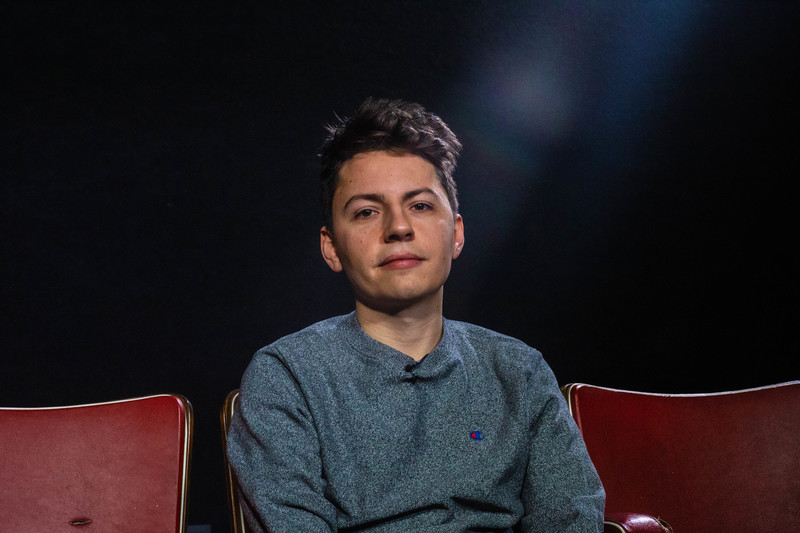
Niels Devlieghere Filmmaker
“As as I became more and more
part of Angela’s life,
I started to notice how small details
in her environment became tangible
and impossible to ignore.”
- Can you introduce yourself?
I’m 28 years old, and I live in Brussels, Belgium. I’m a director and photographer, mainly focusing on documentaries. The idea of becoming a filmmaker, and my love of cinema, didn’t come to me at a young age, it came when I was in my twenties.
Despite not having a background or a career in film, my parents did introduce me to cameras at a young age. I remember my mom would always be around taking pictures of me and my sister, and she would show me how an analogue camera works. Later, when video camcorders (with tapes!) became affordable, my dad bought one, and my friends and I used to shoot short films with it. We dressed up, built scenery, and made our own version of Star Wars!
During my years at university, I slowly started to realize that I wanted to make films. So I started going to an art-house cinema multiple times a week, and fell in love with some of the things I saw there. Sometimes I was the only person in the theatre, and they had to run the movie just for me!
I completed my degree and graduated as an architect. Two days after graduating, I did my entrance exam at the Royal Institute for Theatre, Cinema & Sound in Brussels, and got in. This time I felt like I was in the right place.
From then onward, everything went really fast, which is good. I like living and working that way. In September of 2020, I graduated with my film Elong E’nabe.
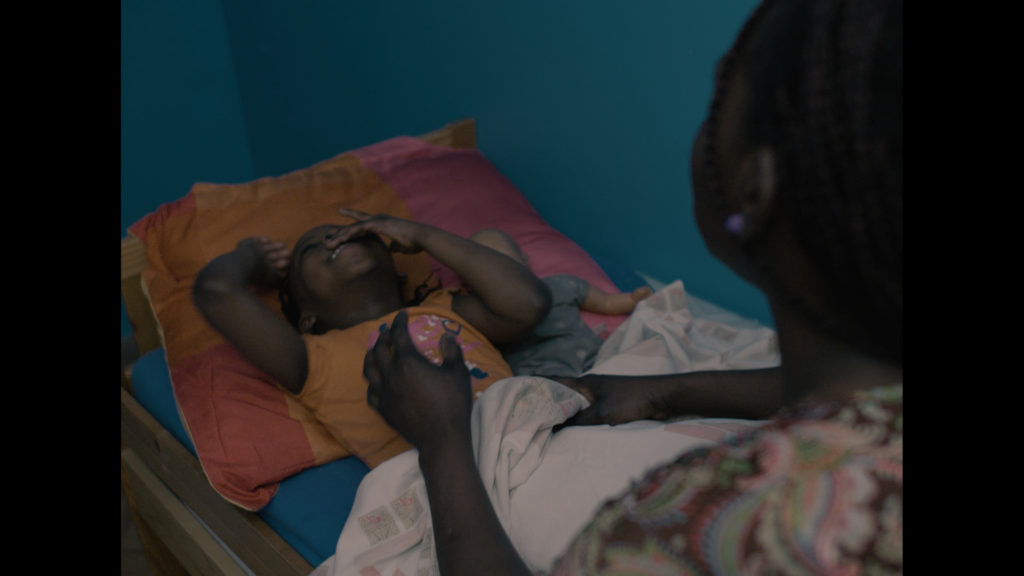
- How did the project start out? How did you first meet Angela and her family?
I had the idea for this project in mind for a long time. I had always wanted to make a film that tells the story of a place by following the lives of multiple characters. That was the initial approach. I think the film still does this in a certain way but maybe more subtly than I originally anticipated.
During my research period, I visited the suburbs of Brussels a lot, always by public transport, so I could chat with people while on the bus or metro. One night I took the bus and I saw this woman sitting there with her two kids falling asleep in her lap. I waited till we all got off the bus, and only then did I approach the mother, Rose. I explained to her who I was and what I was researching for my film while walking to their house in the pouring rain. Once we got to their house, she invited me in and I got the chance to explain myself a bit better.
That evening we ended up talking for a long time with the entire family at the table while having dinner. I had met a lot of different people during that research period but that was the moment I knew that there was a potential for a good story there. I knew this because, as we were talking about the place where they live, Angela, her brother and her sister told me several stories about how they were perceived in public, or how some people would treat them differently because of their skin colour.
A lot of new information came my way, both good and bad experiences, but what struck me the most was the way these kids were dealing with such difficult topics, and questioning their identity, just because of the place where they were growing up. I noticed how there was a very sensitive side to their lives, being confronted daily with discrimination and questions of belonging. On the other hand, I saw how the mum, Rose, fought to create a safe home for her kids, where they were shielded a bit from the reality of the outside world. The duality of that situation spoke to me, and that’s when I decided to make a film about the life of Angela.
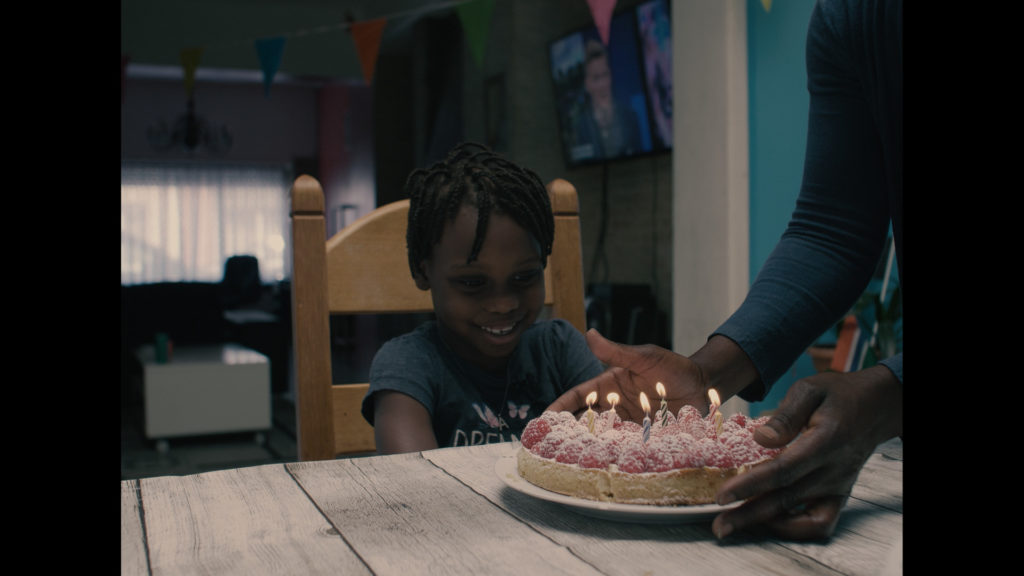
- What’s different when you’re filming children?
Are they self-conscious when there’s a camera around, like adults are?
When shooting a documentary, I always try to create situations or settings where my subject forgets that we are doing something ‘important’. I always want the people I work with to feel as natural and comfortable as possible being in the presence of me and the camera, so that things can happen naturally in a scene instead of me having to ask someone to do a certain thing. I don’t like that.
My method is to spend a lot of time, usually a few weeks or months with them, observing their daily routines without interrupting. I try to talk a lot with the person I work with to get to know them and to discuss ideas about the film I’m about to make. I make very intimate and personal films, and they are the result of an interaction, a collaboration between me and the subject. I want them to have a fair say about what’s good and what’s not. That way we create something together, and you achieve a result which both parties are satisfied with.
So in the case of Angela for example, I spent a long time waking up early, going to her house, having breakfast together, taking the bus to school, picking them up from school, having dinner, doing her homework, praying, etc. I did that for a long time, also bringing my director of photography (DOP) Pauwel Billiau along so they could also get to know him.
When we eventually start filming and we are filming a scene in their bedroom, for example, they are already so used to us at that point that they have forgotten we’re even there, so to speak. That’s when natural things can happen in a scene.
The scene with the paper planes is a bit of an exception, because that was more an idea we got while playing with them: to make a scene out of it. That’s the beauty of filming with kids. There’s that innocence and playfulness where you can ask them if they want to fold paper planes and throw them directly at the camera and they don’t even hesitate for one second.
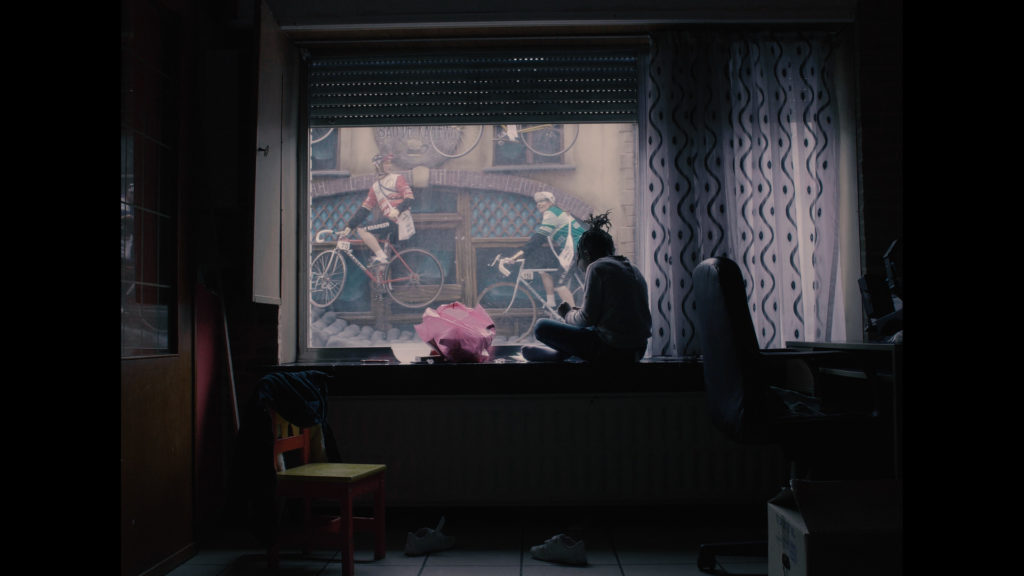
- The film is interspersed with interventions by Rose, we hear her off-screen, ‘talking’ to her daughter. Can you tell some more about this process of narration?
I got the idea for the voice-over from the prayers of Rose. Every night before bed, Rose calls the kids to her bedroom and they all sit on the bed while she prays for them. During the time when I was observing their everyday life, I heard a lot of these prayers. I liked these moments because that’s where thoughts, concerns, and wishes were put into words. These intimate prayers were exceptional moments to me because I witnessed how Rose is a very strong but silent force within their family.
She’s a person who will do anything to help and push her kids to succeed in life, and to live a happy life. But a lot of that happens behind the scenes. The kids don’t notice all the little things she does for them to succeed. Rose doesn’t use a lot of words to express herself. Sometimes she’ll convey more with just her eyes and the way she looks at Angela, who is showing the drawings she made in school. That was my perception of Rose. And I wanted to translate that to the audience.
The decision to add a voice-over came after we had already shot everything, I was showing Rose a rough cut of the edit and told her my idea. She liked it a lot and started writing a text in her native language, which is Wolof, from Senegal. We recorded a few versions, and I put it in the edit to see if it worked. Then I would go back and we would work on the text a bit more, and eventually, we had it. We wrote the texts together, but most of it came from her, because I asked her to write something to her daughter in the same way she prays for them every night. When we had the final version I built a small recording room with blankets and pillows in their bedroom, and Rose recorded the voice-over in there.
- You shot in a 4:3 ratio, which is rare nowadays.
Can you tell us more about this choice?
The choice for this ratio was clear from the beginning. I told my DOP that I wanted to show the life of Angela in an intimate and close way, so he suggested the 4:3 ratio or even closer, and after shooting a test we found it worked well, because as a viewer we keep our focus on her; there’s no room for distraction, and that’s what we wanted.
Another suggestion my DOP made was to shoot everything at the eye level of Angela, that way we can enter her world even more. I liked that idea, so then we had to look for practical solutions on how to shoot comfortably at this level for a longer period. We customized some rigs to make it work.
This way of working with a DOP is very stimulating, and that’s how Pauwel and I did it for the entire process of the film. Pauwel has been a very important part of this film for me. He developed a very good relationship with the family as well, and he’s the first person I would call when I had an idea for a scene. We didn’t know each other before this project, but since making this film we have become very close friends, and he is also going to be involved in my future projects.
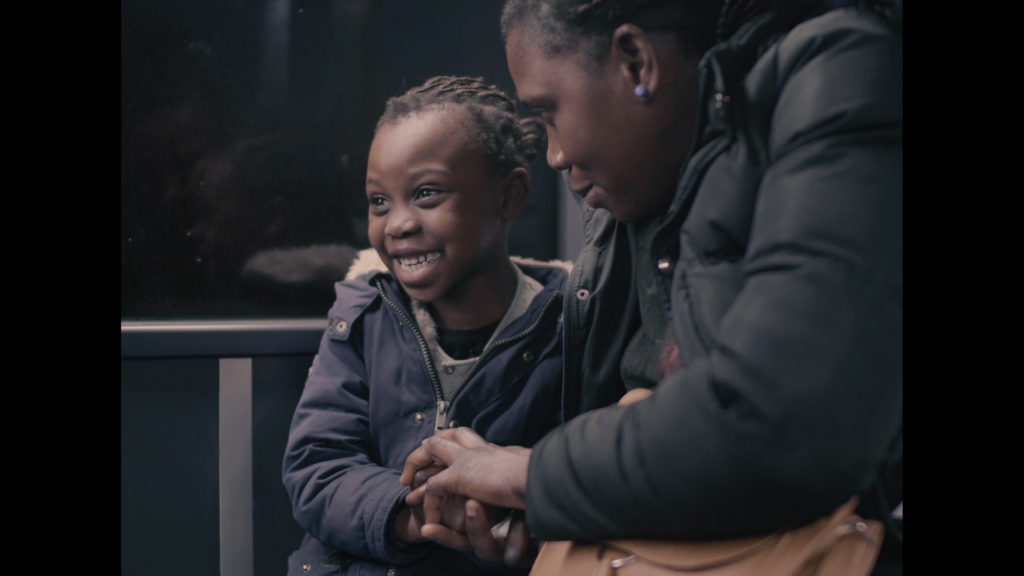
- In your film, politics remain in the background: the news on the radio mentions George Floyd, the children talk about racism, you focus on the Flemish flags through Angela’s window. What does this film say about Belgium, and Flanders in particular?
Initially, it was not my intention to make a film that carries a certain political message, but as I became more and more part of Angela’s life I started to notice how small details in her environment became tangible and impossible to ignore, elements that tell us something about the context she grows up in.
Angela’s parents moved from Senegal 15 years ago because the situation in their region was getting too dangerous. They first arrived in Brussels, and after living there for a few years they wanted to move out of an expensive apartment in the city and find a house to live in that’s more open and affordable — to start a family. That’s how they ended up in a region outside of Brussels, in the city of Ninove.
Here, housing is more affordable, there are more schools, good public transport, and more greenery. This migration away from the capital Brussels to the nearby region is something that has been going on for a long time but has increased enormously in the last five to ten years. This transition of families out of the big cities to the nearby regions has also shaped our demographic landscape in Belgium. And along with that came a lot of new conflicts and friction between the newcomers and the ‘locals’ who have been living in these ‘rural cities’ their entire lives. The people who were born in these places were used to a lifestyle that was more calm and local, away from the big cities.
Over the last decade, they have seen a drastic change, as their villages and cities became inhabited by newcomers with all sorts of backgrounds, mostly young families who find it more affordable to live in a more rural setting, rather than to pay for an expensive apartment in the city. In some of these places, local politicians seized the opportunity and started campaigning with polarizing ideas. They try to gain popularity with the ‘natives’ by spreading an ideology that plays on the politics of identity. They win over more voters by convincing the people that the newcomers are a threat to their heritage, values, and identity as Belgians.
The problem with this is that they drive two groups of people apart, they create two sides that weren’t opposites to begin with. But by convincing one side that the other will come and invade everything, they play on a very basic emotion: fear. And it’s by playing on that fear that a lot of opinions about the wave of newcomers drastically changed in these places, and more people turned to right-wing political parties.
The arrival of a large African community creates friction in many places because a large part of the ‘local’ population is already dealing with problems such as poverty on a daily basis, and feels threatened by the newcomers. Behind all of that lies fear; they no longer feel at home, and feel abandoned, especially by the social authorities. Very often these are people who struggle to manage with the rapid changes. They would love to go back to another time that has passed, and hope that it will one day return.
I want to stress that this is my perception of the situation; I gathered my information by talking to as many different people and asking them what their experience is living in this region. It is not the absolute truth, but it’s a piece of background information that might help us understand why certain people react to change the way they did, and why polarization has had such an effect in places like these.
So, as I was learning more about the situation Angela was growing up in, I found myself being confronted with a lot of elements that carry a social and political weight. These elements are part of the habitat of this six-year-old girl who is questioning her own identity and wondering whether or not she belongs in this place. It’s at this point that, as a filmmaker, I had to decide how to deal with such elements; and there is no correct answer to that because these are ethical questions. I talked to a lot of people about their thoughts on the ethics of the situation and how they think I should portray people. And again, there are no right answers, only more questions that arise once you start digging deeper into this complex matter. Now, there are several elements subtly incorporated into my film, because I wanted to show the viewer how a social environment finds its way into the life of a six-year-old, and how she may or may not realize everything that’s going on yet. The interesting part for me was also to show the impact of these circumstances on her older brother (age 10), older sister (14), and the parents, so that the viewer sees how they perceive these circumstances at different stages in life.
The Flemish flag you see in one scene for instance was not shot to suggest that the neighbours are nationalistic but rather to hint at the political side of the story. Because in the past year I have met so many people in this region that had very sensitive and hard stories, and I’m thankful to all of them. So the neighbours that have the Flemish flag hanging outside… it’s not because they are resentful people seeking conflict. For me, it rather tells the story of how, in certain places, such distorted and bizarre contrasts can arise as a result of political ideologies and fear.
During the process of making this film, we also came across some events that were just too important to ignore. For example, last year in May the Black Lives Matter movement started in the US, and quickly became a worldwide thing. At that time we were in the process of filming a movie that on some level dealt with the same issues. I witnessed how the news during that period was perceived in this family, and it was very impactful for them — as it was for everyone worldwide, I think. The BLM protests are something that will forever be remembered in history as a changing point in awareness about certain issues. So, after witnessing the impact on the family, I decided to include it in the movie, but with a certain nuance. I wanted to show how these outside influences are perceived by the mother, who understands the weight of the news she is watching on TV, while Angela sees what’s happening on television but maybe doesn’t fully understand what it means. This contrast I thought was interesting.
So in the film, there are degrees of difference in what’s shown in the foreground and what’s in the background, because I found it more empowering to focus on the connection between mother and daughter, and how a mother protects her child from the outside world in a certain way. I think it works on another level. I tried to make a film that didn’t accuse a certain group of people or a specific city, so that the movie could have happened anywhere, so that more people also outside of Belgium could identify with the story. I aimed at that universal aspect because, in the end, every parent wants the best for their child.
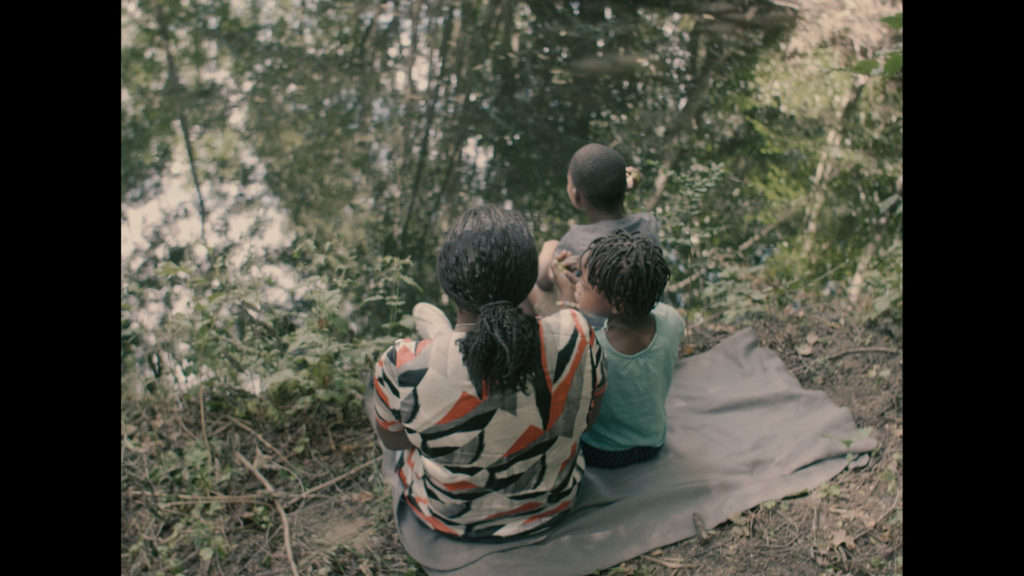
- A word about 99 and the multilingual subtitling of your film?
I’m extremely honoured that my film is showcased on 99 because it’s an amazing
opportunity as a young filmmaker to be able to share your work with this many people in all these languages worldwide.
I’m very grateful that a platform like 99 exists, because it enables young creators to grow, by supporting them and putting in the hard work of translating it into all these languages. After all, language is the ultimate way to connect.
